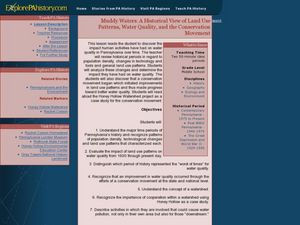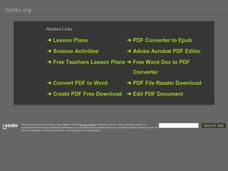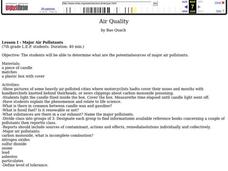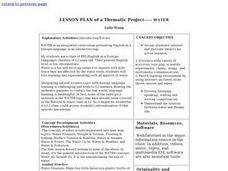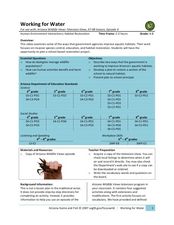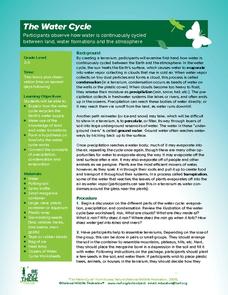Curated OER
Seepy Sandwich
Students study how water infiltration can carry pollution underground. In this water infiltration lesson, students conduct an experiment on water infiltration and underground pollution.
Curated OER
Muddy Waters: A historical view of land use patterns, water quality, and the conservation movement
Students research the impact that human activity had on Pennsylvania's water supply over time. In this water quality lesson plan, students research, discuss, and write about how Pennsylvania's water quality has been affected and what...
Curated OER
Watershed Protection
Students explore environmental care by participating in an Earth science activity. For this clean water lesson, students discuss what a watershed is, how they become polluted, and how it affects the overall quality of drinking water....
Curated OER
Earth Day
Students explain that there are pollutants in the Anacostia River, what those pollutants can cause, and how to prevent further pollution. They read about pollution and graph levels of fecal coliform in the water.
Curated OER
Water Pollution Graphing Activity
Students describe and identify the link between land use activities within a watershed and water quality. They evaluate the quality of a "water sample" ( a bag of skittles), graph their results, and form a hypothesis about the land use...
Curated OER
Water Quality Monitoring
Learners study the water quality of a stream in their area, by measuring the temperature, pH, alkalinity and conductivity. They integrate biology with earth science when using the microscope to study the living organisms in the water.
Illinois Department of Natural Resources
Section Two: Why is Biodiversity Important?
Explore soil, genetic traits, natural resources, and pollution in a series of lessons that focus on biodiversity. Kids complete experiments to learn more about the importance of varied genes and organisms in an ecosystem.
Curated OER
Crossing Polluted Waters
Pupils investigate the different concepts involved in crossing a body of water that is polluted through a simulation that is supposed to be done without a boat. The goal of the lesson plan is for groups to role play after creating a plan...
Curated OER
Non-Point Source Pollution
Students study non-point source pollution. They research the concept of bio-degradation and/or Nutrients/Fertilizers and discuss how non-point source pollution impacts the environment. Afterwards, they participate in an interactive...
Curated OER
Aquatic Habitat Water Quality Experiment
Fifth graders discuss the importance of water quality for humans and fish and make predictions about what happens to water that is polluted. In small groups, they conduct experiments to compare and contrast water that is unpolluted and...
Curated OER
The Water Cycle - Family Page
Learners discuss the steps of the water cycle. They create their own model of the water cycle. They complete the Family Page at the end of the lesson.
Curated OER
Air Quality
Students determine potential sources of major air pollutants, explain how acid rain is generated and how it affects the environment, discuss global warming, and explore protective role of ozone and cause of ozone layer thinning. Lessons...
Curated OER
Human Impact on the Environment and Pollution
Pupils illustrate the impact humans have on the environment through analogies and models. They observe demonstrations of human impact and pollution and create a composite picture of how people can have an impact on their environment.
Curated OER
Where Do We Get Clean Water?
Students investigate the concept of a filter. They use simple supplies in order to construct one after watching a demonstration performed by the teacher. An important warning that the project water is not clean for drinking is included....
Curated OER
Air Pollution
Students research and find information on air pollution. In this air pollution lesson plan, students answer short answer questions about air pollution.
Curated OER
Lesson Plan of a Thematic Project - Water
Sixth graders investigate the properties of water. In this life science instructional activity, 6th graders create a concept map of water. They share their work with the class.
Curated OER
Working for Water
Students examine the ways that government works to help improve aquatic habitats. In this water habitats lesson students view a video and plan a school restoration project.
Curated OER
The Water Cycle
Learners are introduced to the components and importance of the water cycle. They are shown how groundwater moves using a model. Students list 9 places on earth where water is found. They define the terms cycle and water cycle.
Curated OER
The Water Cycle
Students list the nine places on earth where water is found. They define the terms cycle and water cycle. Students explain how energy from the sun powers the movement of water molecules through the water cycle. They name and describe...
Curated OER
How would an oil spill affect a Marine Sanctuary?
Students explore the concept of environmental stewardship. In this science lesson, students discover how scientists assess damages to the environment following oil spills. Students conduct a simulation of a public meeting in order to...
Curated OER
Leach Out and Touch Someone
Students discuss how groundwater becomes polluted. In groups, they design and create models of groundwater pollution sources. They demonstrate to the class how the water may become contaminated from local and nonlocal pollution sources.
Curated OER
You Are What You Drink!
Students explore water treatment systems. In this water conservation ecology lesson plan, students identify and explain several processes used for water treatment and define related vocabulary after listening to content information given...
Curated OER
Week 8 - Sea Life
Using a magnifier, mini marine biologists examine the barbules of a bird feather. They swirl the it into a mixture of oil and water and then re-examine the feather. After the activity, discuss how the oily feathers pose a problem to sea...
Alabama Learning Exchange
Nature's Life Cycle
Become a member of the Pollution Patrol and stand up to litter! After discussing the life cycle of seeds and discussing how plants figure into the food chain, young conservationists engage in several activities involving podcasts,...



